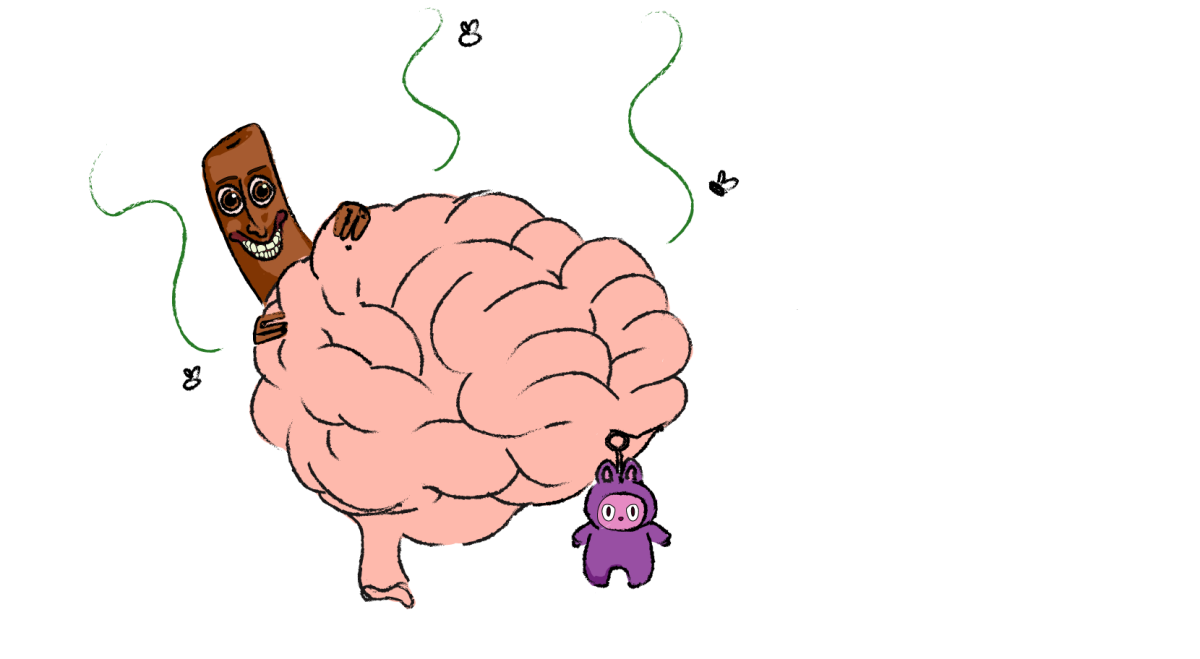
Kennedy Bates
Would you describe someone as skibidi or sigma, are you constantly mewing and do you own a Labubu? If you said yes to any of these, there is a possibility your brain is rotting.
In 2024, 37,000 people publicly voted for brainrot to be the Oxford word of the year. According to Oxford, brainrot describes a deterioration in a person’s mental or intellectual state, particularly a loss of critical thinking and focus, caused by the overconsumption of low quality, repetitive online content.
While its usage has risen recently, brainrot isn’t necessarily a new word. The first recorded use of this word is from 1854, in Henry David Thoreau’s book, “Walden.” In modern times, brainrot is associated with bedrotting and scrolling on social media, but of course Thoreau wasn’t on TikTok. However, the way he used the word brainrot is actually the same way it is used today, meaning a decline in intellect.
“While England endeavours to cure the potato-rot, will not any endeavour to cure the brain-rot – which prevails so much more widely and fatally?” Thoreau wrote.
He was describing mental decline from a society having shallow ideas rather than deep thoughts, leading to suppressed curiosity.
Since technology has advanced, television and phone strain have become a rising concern. According to Pew Research, 67% of parents reported overuse of screens from their teenagers in 2023.
Chris Savage, an IB psychology teacher at Upper Arlington High School described brainrot.
“It’s a term loosely used now to talk about the idea that too much screen time has eroded teenagers’ brains, especially the ability to focus to hold attention for long periods of time,” he said.
Many concerns have been raised, including that students having access to endless scrolling in school worsens their ability to cognitively function.
“The attention span is an issue in the classrooms, but I also think that with social media and technology in general, a lot of individuals think they can multitask effectively because they’ve been able to do so to some extent,” Savage said. “Multitasking is not necessarily the best thing to do when it comes to truly focusing on material.”
Endless scrolling might not be nourishing for your brain, but most students can all relate to it. Kindergartener Ray Thompson enjoys playing games and watching videos on his iPad.
“I like to watch YouTube and play ‘My Singing Monsters,’” Thompson said.
Brainrot has transformed throughout the years. Some examples of brainrot in the early 2000s were “Annoying Orange,” “The Duck Song” and the “I’m a Gummy Bear” song. In the 2010s, popular brainrot included “Nyan Cat”, the “Doge” meme and the “Troll Face” meme. In 2013, the app Vine took the world by storm, bringing in a new style of content: addictive short form videos.
During quarantine, TikTok popularized more brainrot terms, words like sussy, baka and cap. Some of the most popular brainrot from the past two years include skibidi toilet, a head in a toilet singing songs; mewing, a tongue position to improve jaw aesthetics; John Pork, an AI generated pig who has beef with a rat named Tim Cheese; and Italian brainrot, with characters like Brr Brr Patapim and the love story between Tung Tung Sahur and Ballerina Cappuccina. All feature catchy repetitive tunes. Most recently, the Labubu, a line of collectable toys created by Popmart, emerged..
Upper Arlington High School’s IB social and anthropology teacher, Linda Carmichael, shared one aspect of brainrot.
“You could also be building a sense of belonging, because you’re not the only one involved in this overconsumption. There are others, and when you’re able to group yourself with other people that are interested in the same brainrot material, you’re creating something called an imagined community,” Carmichael said. “You may not know each other personally, but you know each other through this medium, and in that way you are creating a community.”
According to Oxford Press the frequency of the word has even grown in usage by 230% between 2023 and 2024, now even being discussed amongst adults. However a lot of adults might be clueless.
“Sometimes my parents don’t know what I’m talking about,” Thompson said.
Modern day language is everchanging. One day a duck might ask you if you have any grapes, and you might have six or seven, but then you lose focus and start thinking about the new and latest videos you could be watching. Whether or not you enjoy brainrot, it will always be around you.
